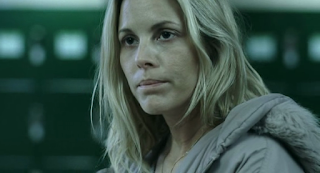It bears repeating that the lines between horror movies and other types of movies are in my opinion thin and somewhat arbitrarily constructed. Not all horrors are supernatural, and thrillers and even dramas can be horror movies.
Cases in point are the last two things about which I wrote before now - American Horror Story, currently juxtaposing demonic possession and mad scientists with the cold, ugly repression of mid-60s America; and Lovely Molly, a haunted house story filled with literal and metaphorical ghosts. Hell, one of the most common readings of/explanations for horror film is that supernatural horrors serve as safe proxies for our real-life horrors, and I already spent a bunch of paragraphs talking about what horror movies are and aren't about. The Shining is about a haunted hotel, but it's also about Jack Torrance's fear of not being able to provide for his family. His caretaking job at the Overlook is his last chance before things start getting ugly, and the strain makes him easy prey for the ghosts of the Overlook.
I bring this up again, because one of the scariest, most upsetting movies I've seen this year wasn't a horror movie by any stretch of the imagination, but neglecting it as part of the broader canon would be a big mistake. Downloading Nancy is a drama, it's a tragedy. It's not a horror movie, but it's full of horror.
We open on Nancy, who is taking a bus to meet someone. She's told her husband, Albert, that she's going to Baltimore to hang out with some friends. She isn't. She's going to meet one person, one man. Their conversation is circular, tentative - they both know each other and don't know each other. They've spoken before and are meeting for the first time, for a specific purpose, to do something Nancy has been anticipating and fantasizing about for a long time.
Our glimpses of her life with Albert are sad, cavernous with silent resentment. He…well, it's not clear what he does, really. Something to do with prototyping and selling video golf equipment to executive-class facilities, like Platinum Club lounges at airports, stuff like that. Nancy spends a lot of time on her computer - she has some kind of computer-based business, and a lot of Internet friends. It's an unhappy marriage, and Nancy's taking a bus to meet someone with whom she'd been talking online. Nancy wants to be free, and this man can help her in ways Albert can't, or won't. Ways that involve ropes and a lot of plastic, like you'd use to wrap up something big and heavy.
The scale is small - a married couple, a therapist, and another man. Nothing here is supernatural, nothing here is elaborate or themed. These are people who have lost their way, lost the ability to connect, who cannot hear what others are telling them, even when they're screaming at the top of their lungs. Nancy and Albert can't communicate anymore if they ever could. Nancy's therapist thinks she's listening, but she's not hearing what Nancy is trying to tell her. Nancy is broken, destroyed inside and has been for most of her adult life, and nobody understands or is willing to accept that. She wants out, and nobody will let her go.
It becomes apparent pretty soon what's going to happen, and the movie has the awful weight of a train rolling downhill. You know where it's going to end up, it's not going to end up anywhere else, and every second it takes to get there hurts. It's just a matter of how bad it's going to get. It's really scary, on a human scale, which is the scariest scale of all. These people live and breathe and hurt in the world in which we live, not another world where men in hockey masks dismember sexually promiscuous teens. That's the worst of it, that we know these people for better or worse, and this could happen to us. There's no safety in critical or ironic distance here. Just pain, and a dreadful inevitability.
The film looks as cold and alienating as its story is . Everyone and everything is bathed in a cold, sickly glow, sterile and empty. It's the America that exists outside of the spotlight, the houses in the suburbs, the business functions in event rooms in hotels, the America nobody bothers to write or make movies about. These places are awful in their familiarity - Nancy's computer desk (immediately evocative of the beginnings of mass Internet culture, when for some people, the computer was something around which you built a little environment), the plastic on the couch, bus stations, hardware stores. All converging on a terrible end. The smallest details tell your worlds - we don't know much about the other man, but he lives in a business space, filled to the rafters with videotapes. It's never made clear why, but you know it's nothing good.
Ultimately, it's a story about everyone who has let Nancy down her entire life - family, friends, therapists, loved ones, and the one sent to finish the job. There's nothing supernatural here, what haunts Nancy is memory, not ghosts, there are no serial killers with elaborately staged kills, no vampires, no alien monsters (unless you count how Nancy feels about herself), just loss, crushing inevitability, and one woman, trapped by life, howling like a wounded animal. I don't care what it says on the package or the web page or whatever, this is horror.

